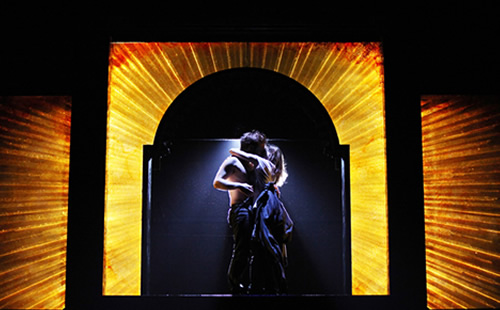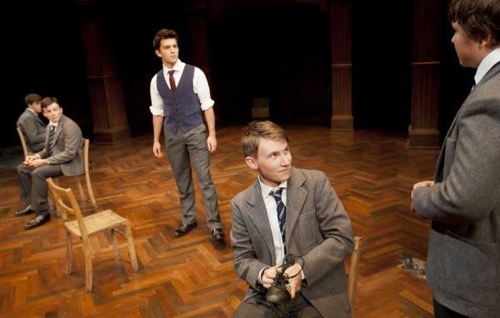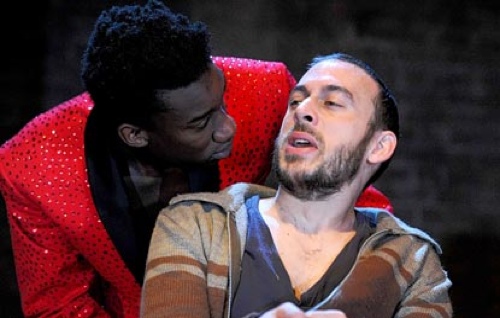
Rupert Goold, who one might presume on past form to offer us a tricks-y reading of the play, instead presents a rather more traditional Romeo & Juliet, and consequently it is more thrilling and contemporary than expected. This is outstanding; Goold’s Romeo & Juliet is glorious, glorious, glorious.
On a shimmering gun metal stage with steaming air vents and drains that spew fire, Tom Scutt’s set, on three sides, suggests an modern urban wasteland, while retaining a traditional Elizabethan staging. The Eliza-modern aesthetic extends to the costumes too; the characters stalk the set in doublet and hose, teamed with Doc Martens while Romeo and Juliet, in jeans and hoodies, are set apart from their families and rooted firmly in our modern world.
Troughton as Romeo is a prodigious Shakespearean talent and his performance is exquisitely subtle and variegated.
Goold’s Romeo & Juliet is one of variable moods, a rough hewn world where violence simmers constantly beneath the surface, occasionally breaking out, as when Richard Katz’s vituperative Capulet hurls a glass of wine in his daughters face and leaps across the table toward her. The opening fight scene is a mêlée of bodies and steam and sound, and the dance at the Capulet’s ball is a tribal affair, all sweaty bodies and pulsating rhythms. Sex and violence is never very far from the surface in this rendering.
Too many directors cast the lovers as a picture perfect pair, concentrating on the many textual references to their beauty and youth, resulting in a union which looks appealing on the posters, but fails to deliver. Attractive, but not preternaturally so, Sam Troughton and Mariah Gale are superlative in the title roles. Goold’s casting eschews glamour for talent, thankfully. Both handle the text with dexterity bringing muscularity to the verse and a clarion lucidity to the language. Gale’s Juliet is a gawky, petulant teenager well-used to getting her own way; an often audacious tease, she is nonetheless without guile, and is sweetly touching and fragile. Troughton as Romeo is a prodigious Shakespearean talent and his performance is exquisitely subtle and variegated. At moments surly, at next gauche, at times florid, he perfectly captures the shifting nature of Romeo’s mood and tenor. Troughton would be well placed to tackle Hamlet soon. There is an astonishing sensualism to the lovers, as there should be, and in their modern garb this ordinarily attractive pair are much more a Romeo and Juliet who speak to every teenager than any Hollywood-handsome coupling could be.
Jonjo O’Neil is a deliciously quicksilver Mercutio, full of overweening braggadocio, while Noma Dumezweni is an absolute delight as the Nurse, merrily shifting between crude and earthy to tender and loving. None of the cast disappoint, the text is blisteringly precise and delivered with athleticism. The overlapping of scenes, and even playing of some simultaneously, accelerate the action to the finale which is as tense and heart-breaking as it should be. Lorna Heavey’s video and projection designs amplify the text, providing haunting images and one moment of breathtaking beauty at the Act One finale.
Without doubt, this is one of the most exquisite Romeo & Juliet’s you will see, an RSC triumph.
***** (5 stars)
Runs until 1st January
More info



I did not care for this unusual interpretation, although the stage set was superb. Dressing Romeo as a hoody and Juliet as a scruffy waif reduced their attractivenes to me and their modern behaviour was interesting but unappealing. Nor did I feel any conviction about their feelings for each other. I can see it may be argued that the idea is to emphasise the modern relevance of this timeless tragedy. However the only time when I felt any genuine emotion present on the stage was when Juliet’s father, Lord Capulet, brilliantly acted by Richard Katz turned ferociously against her and she was evidently scared. The strength of this performance became a central focus and I was reminded of the savagery expressed by men in modern times when their daughters will not accept chosen suitors. At this point the play came to life for me. And perhaps the modern dress was responsible for this. I found the variety of accents hard to follow. It was an unusual and rather weird production. I can see some people find it brilliant. But I was not convinced at the core. I think Sam Troughton’s performance as Romeo was more redolent of a Hamlet. Perhaps I found it insufficiently masculine. Curious since he killed a couple of people but perhaps without real intent. At the end I failed to feel any great sympathy for Juliet.
Theatre Review